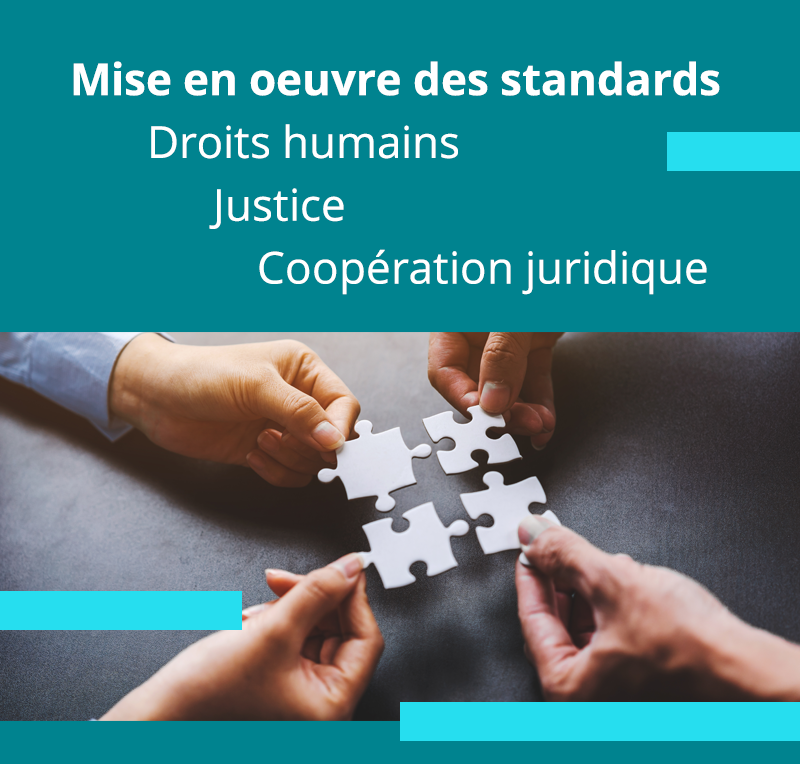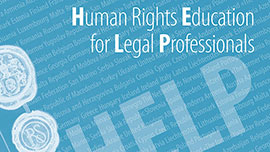Turkey - Strengthening the Capacity of Bar Associations and Lawyers on European Human Rights Standards
The main aim is to strengthen the capacities of Turkish bar associations and lawyers in the implementation of the European human rights standards.
The main partner (end beneficiary) of the Project is the Union of Turkish Bar Associations (UTBA).
The following results are expected under the Project:
- The institutional capacity of the Human Rights Centres of the Bar Associations in 7 pilot provinces is strengthened.
- The capacity of lawyers to apply European human rights standards in their daily work is enhanced.
- The cooperation between the Union of Turkish Bar Associations and Human Rights Centres of local bar associations is fostered.
With a view to achieving these results, following activities will be implemented:
ACTION PLAN and REGULATIONS development
- Action Plan
The Action Plan to be prepared under the Project will determine the activities to be implemented for establishment and proper functioning of the HRCs as well as the resources, time framework and responsibilities of partners for each activity.
- Regulations
Draft regulations for the Human Right Centers deriving from the reported findings of the need assessment visits will be proposed. These Regulations shall provide consolidated legal framework applicable for all local bars in relation to structure, organization, functioning, responsibilities, staffing and financial aspects of the HRCs.
STUDY VISITS and PLACEMENTS
- Study visits
Such visits to European countries will be organised with a view to examining the best practices for HRCs of the bar associations.
- Placements
About 24 placements for approximately 2 months for representatives from the pilot bar associations and the UTBA will be organized in various departments of the Council of Europe, European Court of Human Rights, as well as bar associations in various European countries and international lawyer organisations.
These placements will help local bars and the UTBA to build their networks and exchanges with colleagues on human rights protection. The participants of such placements will be able to learn the respective procedures in the organisations where they will be places and best practices and working methods there, to establish bilateral relations, which will be accordingly applied in the Turkish HRCs of the bar associations.
TRAININGS
- Needs assessment
The assessment of the respective training needs of lawyers and the methodologies to be used will be applied in drafting training modules and organising training sessions in local bar associations.
- Training materials
Training tool kits, including manuals for trainers and materials for participants, tailored for the needs of pre- and in-service trainings for lawyers, will be published and disseminated to trainers, UTBA and bar associations . The tool kits will also be available in electronic format and published online in Turkish and English. Complementary resources, such as practical instructions how to monitor and report human rights violations or how to make a complaint before national and international bodies will be developed and published.
- Training sessions
Training sessions applying interactive methodology will be organised for 50 lawyers. Such sessions will focus on fundamental rights, admissibility of applications to the ECtHR, procedures and judgments of the ECtHR, as well as other national remedies such as Turkish Constitutional Courts, Ombudsman and Human Rights Institution of Turkey.
Another session on training methodology and methods will be proposed to update on new training methodologies and provide an opportunity to lawyers to exercise their skills as trainers.
A separate sub-session for the 10 candidate trainers will be offered to lawyers, willing to conduct online courses.
200 cascaded training sessions for 5.000 lawyers (25 participants for each training session) will be organised at different levels, in cooperation with the UTBA and local bar associations.
The trainers will use the training manuals, produced under the Action, in order to sustain consistency in all training activities.
TRANSLATIONS, PUBLICATIONS and WEB
The major reference documents and resources needed for training programmes such as books, CoE handbooks, judgments and policy documents will be translated into Turkish within the framework of the Action.
- Project web-site
The Project will support the bar associations by establishing IT tools to strengthen their capacity. A Project website will be established under the webpage of the UTBA. This website will contain news, documents, training material (including online modules) and other outputs of the Project and will help disseminate those outputs to all lawyers in Turkey.
- Web-based network
A web-based communication network between the UTBA and HRCs of bar associations will be developed in order to facilitate the communication among the lawyers working in the HRCs. The pilot bars and UTBA will be able to see the database of each other with this communication mechanism.
A database for identification of risk areas at national level will be created by recording the particular repetitive violations detected by the HRCs of the bar associations. The database will be a standardised tool including reporting templates, guides for users and provide information on a number of applications to HRCs, reports produced, actions taken and their results when available. The non-technical design and content of the data base tools will be supervised by one international consultant.
CONFERENCES and MEETINGS
Four awareness-raising meetings will be held in Ankara and Istanbul in order to share findings of HRCs with other stakeholders, such as judges, prosecutors, law enforcement officers and civil society representatives. These meetings will serve as a platform to discuss most pressing human rights issues as reported by the HRCs and identify challenges and practical solutions, taking into account the roles of each stakeholder in this regard.
Project information
- Duration: 48 months (1 April 2018 – 30 June 2022)
- Place/ country: Turkey
- Budget: 3 890 000 €
- Funding: This Project is co-financed by the Republic of Turkey, the European Union, and the Council of Europe
Project documentation
Closing Conference of Strengthening the Capacity of Bar Associations and Lawyers on European Human Rights Standards Project Held
The closing conference of the European Union - Council of Europe Joint Project “Strengthening the Capacity of Bar Associations and Lawyers on European Human Rights Standards” was organised on 23 June 2022 in Istanbul. The topic of the conference was Freedom of Expression: Transformation and...
6th Awareness Raising Meeting and Launching of e-Library
The 6th Awareness Raising Meeting of the EU-Council of Europe Joint Project “Strengthening the Capacity of Bar Associations and Lawyers on European Human Rights Standards” was organised as a hybrid event in Ankara on 23 May 2002. Representatives of the Council of Europe and the Union of Turkish...
The European Union-Council of Europe Joint Project “Strengthening the Capacity of Bar Associations and Lawyers on European Human Rights Standards” held its 7th Steering Committee Meeting and 11th Management Meeting
The seventh Steering Committee Meeting and eleventh Management Meeting of the European Union-Council of Europe Joint Project “Strengthening the Capacity of Bar Associations and Lawyers on European Human Rights Standards” was held online on 11 May 2022. The representatives of the Council of...




